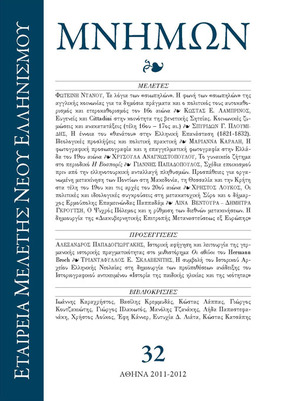Έμποροι στην Αυστρία του «μακρού» 19ου αιώνα
Part of : Μνήμων ; Vol.33, 2014, pages 133-167
Issue:
Pages:
133-167
Parallel Title:
Merchants in Imperial Austria during the ‘Long’ Nineteenth Century
Section Title:
Articles
Author:
Abstract:
This article, which draws mainly on the Archives of the Austrian Ministry of Commerce, as well as on contemporary works and modern li terature, focuses on the examination of the historical course of merchants (above all the whole sale traders and the well suited shopkeepers and retail merchants) in Old Austria as a distinctive group within the Central European bourgeoisie. The contribution of the merchantmagnates (Großhändler) to the industrialization of the Austrian Half of the Habsburg Empire and the formation of a powerful business class, the importance of the involvement of businessmen from abroad in Austrian wholesale and foreign trade, the grip of the state and imperial allegiance in the commercial sector, the social position and the political activity of merchants– primarily at local and regional levels –as well as the attitudes of the multiethnic merchant class towards all kinds of nationalist movements in the late nineteenth and the early twentieth centuries, are the central issues of this essay. Merchantmagnates, among whom many of foreign provenance or/ and not of Catholic faith (Protestants, Jews and Greekorthodox) established themselves as the most active entrepreneurial group within the Austrian bourgeoisie during most of the nineteenth century (at least until the 1870s), since they exploited promptly every new opportunity to accumulate and augment their capital and income: in industry, banking, insurance and other shareholding companies, transport, shipping and real estate. The bourgeois status of the Austrian merchants is confirmed for the same period by their participation in all sorts of (bourgeois) associations, their subscription to public benefit causes, their charitable and philanthropic activities. The imperial state’s favorable disposition towards entrepreneurs in general and merchants in particular, its recognition and reward of their contribution to the Austrian economy and export trade, of their mercantile knowledge and professional experience, as well as of their charity and philanthropic work, are documented in the appointment of honorary consuls of Austria abroad or of consuls of foreign states in the capital and cities of the Monarchy, the conferring of the highest social distinctions on merchants by Emperor Franz Joseph through award of medals, honorary titles and titles of nobility or the merchants’ collaboration with the Ministry of Commerce as elected members and officials of chambers of commerce, as experts, special advisers and commission agents. In addition to the merchants’ indirect relations with politics there were direct ones too, in other words their active participation as elected representatives, primarily to municipal councils and secondarily to the local and imperial parliaments of Austria after the constitutional reforms of 18601861. During the socalled era of liberalism, from the 1860s up to the mid1880’s, it was mainly germanspeaking merchants, who, together with industrialists and other middle class groups, dominated in most towns, whereas in the three decades which preceded the First World War –an era of increasing antisemitism and nationalism– they had to share power with new emerging petitbourgeois strata (among them many shopkeepers). The article concludes with a remark on the upheavals caused to the merchant world by the two World Wars and nationalsocialism, which destroyed the unified economic space of AustriaHungary, nationalized its cosmopolitan bourgeoisie and finally led to the expulsion, material depravation or/and extermination of such a dynamic and prominent group, like the Jewish merchants and entrepreneurs, followed by the abolition of the capitalist economy by the new socialist regimes in Central and EastCentral Europe after 1945.
Subject:
Subject (LC):




